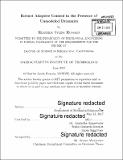Robust adaptive control in the presence of unmodeled dynamics
Author(s)
Hussain, Heather Syeda
DownloadFull printable version (14.93Mb)
Other Contributors
Massachusetts Institute of Technology. Department of Mechanical Engineering.
Advisor
Anuradha Annaswamy.
Terms of use
Metadata
Show full item recordAbstract
With the advent of each next generation technology, demands for a rapidly reconfigurable control system yielding invariant performance under increasingly unknown or widely varying operating conditions becomes crucial. Adaptive control has long been viewed as one such control method, with implementation on high performance aerial vehicles providing nearly uniform performance across the flight envelope even with limited a priori knowledge on the aircraft's aerodynamic characteristics. This adaptation to parametric uncertainties is achieved through a process of online measurement, evaluation, and compensation through the control input. While the foundations of robust adaptive control theory were laid in the early 1980's, obtaining quantifiable and practically meaningful robust stability margins for adaptive systems remained an open problem. Successful implementation of adaptive control theory as a viable control solution can only be achieved when global robustness properties, especially with respect to unmodeled dynamics, are well understood. This thesis proposes a solution to this long standing open problem for a class of linear time-invariant plants, whose states are accessible. With the use of a modified adaptive update law, transformation of tracking and parameter errors, and sufficient conditions of a frequency-domain criterion, it is shown that the underlying closed-loop system has globally bounded solutions. That is, the overall adaptive system is shown to have analytically computable robustness margins that hold for arbitrary initial conditions. The proposed method and analysis utilizes several key properties of nonlinear dynamic systems, first principles of real analysis, and properties of strictly positive real systems to derive this fundamental result. Numerical results are presented to demonstrate that the sufficient conditions for global boundedness are non-conservative. It is also shown that, with these global properties established, specific conditions can be derived under which the advantage of adaptation over non-adaptive solutions for the control of uncertain systems is made clear. This advantage lies in the fact parameter adaptation allows learning of the uncertainties whenever the effect of unmodeled dynamics is small, leading to small tracking errors and improved robustness margins.
Description
Thesis: Sc. D., Massachusetts Institute of Technology, Department of Mechanical Engineering, 2017. Cataloged from PDF version of thesis. Includes bibliographical references (pages 127-131).
Date issued
2017Department
Massachusetts Institute of Technology. Department of Mechanical EngineeringPublisher
Massachusetts Institute of Technology
Keywords
Mechanical Engineering.